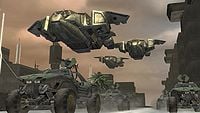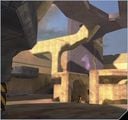Earth
From Halopedia, the Halo wiki
Template:SeeWikipedia Template:Planet
- "Fight for her."
- — Bulletin board poster of Earth
Earth (known as "Erde-Tyrene" to pre-historic humans and the Forerunners[1]) is the third planet of the Sol system, and one of four terrestrial worlds. Homeworld of the human species, Earth has been at the forefront of galactic history, from encounters with the Precursors[1] to the end of the Covenant Empire.[2] Inhabited long ago by a pre-historic interstellar human government conquered and dissolved by the Forerunners,[1] Earth is currently the capital world of the United Earth Government.
Earth was possibly the most populated planet of the human space territories. For a significant amount of humanity's history, it was to them the only known place in the universe to support life.
History

Prehistory
- Main article: Prehistoric human civilization
The Earth first formed about 4.6 billion years ago, and gave rise to the first single-celled organisms about 3.9 billion years ago. About 200,000 years ago, the ancestors of modern humans, Homo Sapiens, evolved in Africa. Indigenous to Eastern Africa, they gradually spread across the entire planet. Eventually, the humans, originally consisting of groups of hunter-gatherers, began to develop into civilizations. These civilizations gradually became more and more complex, with some becoming nation-states and empires.
Eventually, possibly through contact with the Forerunners, humanity discovered spaceflight and spread across the Orion Arm of the Milky Way Galaxy. After being defeated in a war against the Forerunner civilization, the humans were exiled back to Earth, with their species devolved and splintered into multiple subspecies and their culture degrading back to a pseudo-industrial state for thousands of years.[1]
At some point, Earth came under the charge of the Librarian, who helped the humans slowly work towards rebuilding a primitive civilization. Remnants of their former technology, such as steam power and hot-air balloon flight, were re-learned under her care but later forgotten after the firing of the Halo Array.
Forerunner-Flood War
Near the end of their war with the Flood,[3] the Forerunners built a machine to generate a slipspace portal to the Ark in Africa.[4] They also indexed the human species as a part of their Conservation Measure to preserve life in the galaxy after the activation of the Halo Array. After the array's activation, human life was planted back on Earth, where it succesfully developed.[5]
Civilization and the Modern Age
- Main articles: Human, World War II
After the recovery from the Array, humans reduced back to hunter-gatherers for nearly a hundred thousand years, until civilizations began to form anew.
By the year 1914, much of the world was divided into two factions, the Triple Entente, or Allies: the United Kingdom, France, Russia, and later the United States of America, and the Triple Alliance, or Central Powers: Germany, Austria-Hungary, and other nations of similar ideals. The Central Powers were defeated at the end of World War I in 1918, resulting in a decade of prosperity for the Allies, followed by an economic depression and the rise of Fascism, Nazism, and Communism in many countries. In 1939, another World War erupted, between the Allies (Britain, the Soviet Union, later the United States, and many other nations) and the Axis (Nazi Germany, Fascist Italy, and the Empire of Japan). In 1945, the Allies defeated the Axis. Later that year, the victorious nations, in an attempt to prevent more World Wars, founded the United Nations, an international assembly of peaceful nations, whose goal was to settle international disputes peacefully, and was the predecessor to the UNSC. In 1957, Humanity finally made their way into space with unmanned probes and by 1961, Humans themselves had gone into space. In 1969, Humanity had finally stepped on an extraterrestrial surface-Earth's Moon.
After World War II, Humanity would lack war on that scale, although smaller wars and conflicts erupted, including the Korean War, Vietnam War, Cold War, and the first and second Iraq War. In the early 21st century, terrorism became a particular thorn in the side for the nations on Earth and small wars broke out along with civil unrest in many countries. However, no full wars on the same scale as past World Wars erupted.
Interplanetary colonization and conflicts
- Main article: Interplanetary War
After years of overcrowding on Earth and the other planets in the Sol System, dissident factions emerged. The Neo-Communist Koslovics and Fascist Frieden, the two major movements, began to battle one another and the United Nations.
In March-June 2160, Jovian secessionists attacked United Nations Colonial advisers on the moon Io, which led to three months of fighting between the Earth military and Jovian Frieden forces. National Governments began to support their own colonies which sparked proxy wars off-planet, leading to tension and militarization on Earth. In 2162 armed conflict ripped through South America, starting the Rain Forest Wars, as Koslovic, Frieden, and UN forces all clashed over ideological differences, sparking additional conflicts off-planet. In December of 2163, the three factions clashed, this time on Mars. This was the first extraterrestrial use of Marines, who launched lightning raids on Koslovic positions, permanently affecting military doctrine for centuries. In 2164 UN forces began a massive military build-up and began the first true interplanetary war. The UNSC was bolstered by a massive propaganda campaign running on the victories on Mars and over the next six years took back the Sol System and drove the dissident factions to destruction. Now with a massive military with no enemy to fight, overpopulation, famine, and a collapsing economy, the newly unified Earth faced an uncertain future.
It was not until 2291 that this problem was solved when researchers created the Shaw-Fujikawa Translight Engine and gained access to Slipspace. In 2310 the UNSC unveiled their first line of colony ships and the best and brightest from both civilian walks of life and the military set out to form the Inner Colonies. This eased the overpopulation problem upon Earth which became the capital of the Unified Earth Government, while the inner colony of Reach would later became the headquarters of the UNSC.
The Insurrection and the Human-Covenant War
- Main articles: Insurrection, Human-Covenant War
Humanity would enter a period of peaceful stability for the next two hundred years, until civil unrest began to spread in the Outer Colonies, with various groups seeking secession from Earth and the UEG. The scale of the unrest would steadily rise, eventually becoming a major threat by 2517 to the UEG's existence, and in response the UNSC began the SPARTAN-II Program.
All this was suddenly and violently rendered a moot point when a single alien ship made an unprovoked attack on the colony of Harvest, humanity's first encounter with an alien civilization - the Covenant. Over the next twenty seven years, Humanity would wage a brutal war for survival, losing hundreds of colonies, including all of the Outer Colonies in 2536; and on August 31st, 2552, the UNSC's largest military installation, the planet Reach, was discovered and invaded by the Covenant. During the entire course of the conflict, the UNSC followed the Cole Protocol, which declared that no UNSC vessel targeted by the Covenant was to retreat to Earth, as a means of ensuring the security of the planet's location.
Despite the effectiveness of this law, on October 20th, 2552, the Covenant launched their first attack upon Earth, initiating the final confrontation between UNSC forces and the Covenant.[6][7]
Pre-Battle of Earth
Prior to the Covenant invasion of Earth, there had been a suppressed influx of information by ONI, resulting in people going about their normal lives even up until the attack. The forces stationed at Earth were heavy, with the Second Fleet, Seventh Fleet, the Sixteenth Fleet and the 6th Battle Group along with large amounts of Marines, Army Troopers, and ODSTs present, five SPARTAN-IIs, Admiral Hood and Earth's most prominent means of defense, three hundred Orbital Defense Platforms, each sporting a Mk. V "Super" MAC. Also, there were numerous human colonies on various moons, a large naval shipyard and factories at Mars, and a listening post at Io.
Battle of Earth

- Main article: Battle of Earth
On October 20th, 2552, the first Covenant forces entered the Sol system. A Covenant expeditionary force consisting of CCS-class Battlecruisers and Covenant assault carriers arrived in system, first detected around Io, the third largest moon of Jupiter.[7] After the existence of the Covenant presence was confirmed by probes, the UNSCDF forces went to full alert. The option was taken to wait for the Covenant forces to come to them rather than let Fleet Admiral Harper launch a counter attack. The Covenant began to work on punching a hole through the orbital defenses by taking out the stations in the battle cluster above the Mediterranean Sea via bombs planted by boarding parties.[7] After the Covenant fleet attempted to rush through the newly formed gap the UNSC fleet annihilated them, destroying most of the Covenant battlecruisers but failing to destroy the assault carriers. One of the assault carrier, commanded by the High Prophet of Regret, assaulted the city of Mombasa in Kenya.[8]
Groundside, the Covenant assault carrier had already deployed its ground forces and had already occupied city. The Covenant ground forces immediately constructed defense emplacements and structures to reinforce their newly-acquired sites against the counter-offensive UNSC forces. The UNSC In Amber Clad was the first UNSC ship to respond to the Covenant occupation. The ship sent in their complements consisting of SPARTAN-II John-117, Sergeant Avery Johnson and elements of the 7th Orbital Drop Shock Trooper Battalion.[8] The Covenant were subsequently dislodged from Old Mombasa and, following the destruction of a Scarab, from New Mombasa as well.[8][9] The High Prophet of Regret eventually ordered a general retreat and had his assault carrier to initiate a slipspace jump while still over the city. The In Amber Clad followed in the carrier's wake, at the cost of the city being severely damaged by the rupture.[9]
Prior during the event, a contingency of ODSTs were dropped from the UNSC Say My Name to assist the In Amber Clad's counter-offensive efforts.[10] The slipspace rupture prevented the assist from taking place, plunging the ODSTs into uncontrolled freefall and scattered across the city. However, one particular squad of ODSTs survived and continued their operation in securing the city's infrastructure AI.[10] During the operation, the squad witnessed the arrival of a larger Covenant fleet after escaping the city.[10]
The Covenant returned in force following the Prophet of Regret's abortive attack and Covenant assault forces succeeded in penetrating the orbital defenses. At Mount Erebus, the sea floor off of the the Yucatan Peninsula, and at the Centennial Orbital Elevator in Havana, Cuba, the Covenant were stymied by three SPARTAN-II's, only to have those SPARTAN-IIs get re-deployed to Onyx.[11] However, UNSC forces were unable to repulse and route Covenant landings in Kenya. After breaking Earth's space defenses, the Covenant bombarded Earth in east Africa.
The arrival in-system of SPARTAN-117 in a Covenant-controlled Forerunner Dreadnought, freshly escaped from the Battle of Installation 05, was unexpected.[12] SPARTAN-117 disembarked from the dreadnought in Earth's atmosphere, later recovered by Marines and taken to Crow's Nest.[13] With the aid of the Arbiter, Commander Miranda Keyes, and Sergeant Avery Johnson, SPARTAN-117 breached the Covenant anti-air defenses near the excavated Artifact, clearing the way for an aerial strike on the artifact.[14][15] The strike was unable to disable the device or prevent the Prophet of Truth from traveling through the portal. After a brief intervention by the Flood a joint Separatist/UNSC force departed through the portal in pursuit.[16]
Following the victory at the Battle of Earth and the Battle of Installation 00, the Human-Covenant War ended in March 2553.
Earth locations
Planetside
Planetside, Earth has seven continents of extremely varied climates and cultures.
Africa
- Diego Garcia - Island in the Indian Ocean and a major UNSC base.
- Arab Republic of Egypt
- Republic of Kenya
- Mombasa - Major African city that was the first landing site of Covenant forces on Earth, destroyed in ensuing attack and retreat during the Battle of Earth.
- New Mombasa
- Old Mombasa
- Turf - The "backstreets"[17] of Old Mombasa, and the location of a downed Scarab destroyed by UNSC Marines
- UNSC Munitions Testing Facility - A decommissioned, hazardous facility turned into an industrial wasteland on the outskirts of Mombasa[18]
- Nairobi - The capital city of Kenya
- Voi - A town further inland from Mombasa and a source of major battles late in the Battle of Earth
- Tsavo
- Tsavo Highway - An overpass highway bridging Voi, Mombasa, Arusha, and other cities together.
- Outpost C9
- UNSC Underground Facility "Crow's Nest"
- Mombasa - Major African city that was the first landing site of Covenant forces on Earth, destroyed in ensuing attack and retreat during the Battle of Earth.
- United Republic of Tanzania
- Mount Kilimanjaro
- Nkuu River
- Zanzibar Island - Location of Wind Power Station 7
- Wind Power Station 7 - Decommissioned wind wheel[19], which was acquired by the UNSC as SPARTAN training grounds.[20]
Oceania
- Commonwealth of Australia
- Sydney
- HighCom Facility Bravo-6 - Home of HIGHCOM and HQ of the UNSC.
- Sydney Synthetic Intellect Institute - A.I. research institute.
- Western Australia
- Sydney
Asia
- Korea
- Kyonggi Province
- Songnam
- Special Warfare Center - Testing and training area, famous for testing the MJOLNIR MK VI and the C and V variants.
- Songnam
- Kyonggi Province
- Pakistan
- China
- Japan
North America
- Canada
- United States of America
- Massachusetts
- Boston
- Chawla Base - An ONI base that housed the artifact from I Love Bees
- Boston
- Ohio
- Cleveland - Site of the Battle of Cleveland; underneath the city is the Key of Osanalan
- Illinois
- New York
- New York City - The Morelli family from I Love Bees all live or were born here.
- Commonwealth of Kentucky - Rani Sobeck from I Love Bees lives here or was born here.
- Oregon - A construction company in the United States is located here.
- Missouri
- Mark Twain- Birthplace of Adm. Preston Jeremiah Cole
- Massachusetts
- Mexico
- Mexico City
- Base Segundo Terra - Mexico City, Mexico. Used as the staging area to attack the Covenant incursions on Havana and the Yucatan Peninsula.
- Mexico City
- Republic of Cuba
- Havana
- Centennial Orbital Elevator - A 200 year old antiquated Space Elevator that was destroyed during the Battle of Earth.
- Havana
South America
- Republic of Chile
- Republic of Ecuador
- Quito - Home to the Quito Space Tether, one of Earth's six Space Elevators.
Europe
- United Kingdom
- Federal Republic of Germany
- Essen
- Beweglichrüstungsysteme Testing Facility - Testing site of the C Variant MJOLNIR MK. VI
- Essen
Antarctica
- Ross Island
- Mount Erebus - Site of a Covenant attack during the Battle of Earth.
Arctic
Orbital
- Athens Station - An ODP defending Earth, destroyed by boarders in the Battle of Earth.
- Cairo Station - An ODP defending Earth. It was the command center of Earth's defense by Admiral Hood.
- Malta Station - An ODP defending Earth, destroyed by boarders in the Battle of Earth.
- Nassau Station - An ODP defending earth.
- Station Wayward Rest - Termination point of the COE. Destroyed during the Battle of Earth.
Luna
- Luna OCS Academy - The Moon-based training academy for UNSC Naval officers.
Gallery
- Zanzibarfull.jpg
Tanaga district of New Mombasa, with the New Mombasa Orbital Elevator in the background. This is seconds prior to the New Mombasa Slipspace incident.
Tactical Autonomous Robotic Defense System testing grounds in Industrial Zone 08 of Chicago, United States of America.
- Earthshot.jpg
UNSCDF Orbital Defense Platforms in geosynchronous orbit around Earth.
The Artifact, buried thousands of years on Earth, unveiled by the Covenant.
List of appearances
- Halo: Combat Evolved (Mentioned only)
- Halo 2 (First appearance)
- Halo 3
- Halo 3: ODST
- Halo Wars
- Halo: The Fall of Reach (Mentioned only)
- Halo: The Flood (Mentioned only)
- Halo: First Strike
- Halo: Ghosts of Onyx
- Halo: Contact Harvest
- Halo: The Cole Protocol
- Halo: Evolutions - Essential Tales of the Halo Universe
- Midnight in the Heart of Midlothian
- Dirt (Mentioned only)
- The Mona Lisa (Mentioned only)
- Palace Hotel
- Human Weakness (Mentioned only)
- The Impossible Life and the Possible Death of Preston J. Cole
- From the Office of Dr. William Arthur Iqbal (Mentioned only)
- Halo Graphic Novel
- Halo: Uprising
- Halo Legends
- I love Bees
- Iris
- Dead or Alive 4
Sources
- ^ a b c d Tor.com — Halo: Cryptum chapter one excerpt
- ^ Halo 3, level Halo
- ^ Bungie.net: Compound Intelligence: All Five Servers Information Compiled
- ^ Halo 3: The Cradle of Life
- ^ Halo Legends, Origins
- ^ Halo: The Fall of Reach, page ??
- ^ a b c Halo 2, campaign level Cairo Station
- ^ a b c Halo 2, campaign level Outskirts
- ^ a b Halo 2, campaign level Metropolis
- ^ a b c Halo 3: ODST
- ^ Halo: Ghosts of Onyx, page ??
- ^ Halo 3, campaign level Sierra 117
- ^ Halo 3, campaign level Crow's Nest
- ^ Halo 3, campaign level Tsavo Highway
- ^ Halo 3, campaign level The Storm
- ^ Halo 3, campaign level Floodgate
- ^ Halo 2, multiplayer map Turf
- ^ Bungie.net: An Affinity for Art
- ^ Halo 2, multiplayer map Zanzibar
- ^ Halo 3, multiplayer map Last Resort
- ^ Halo 2, multiplayer map Foundation
- ^ Halo 3, multiplayer map Blackout





